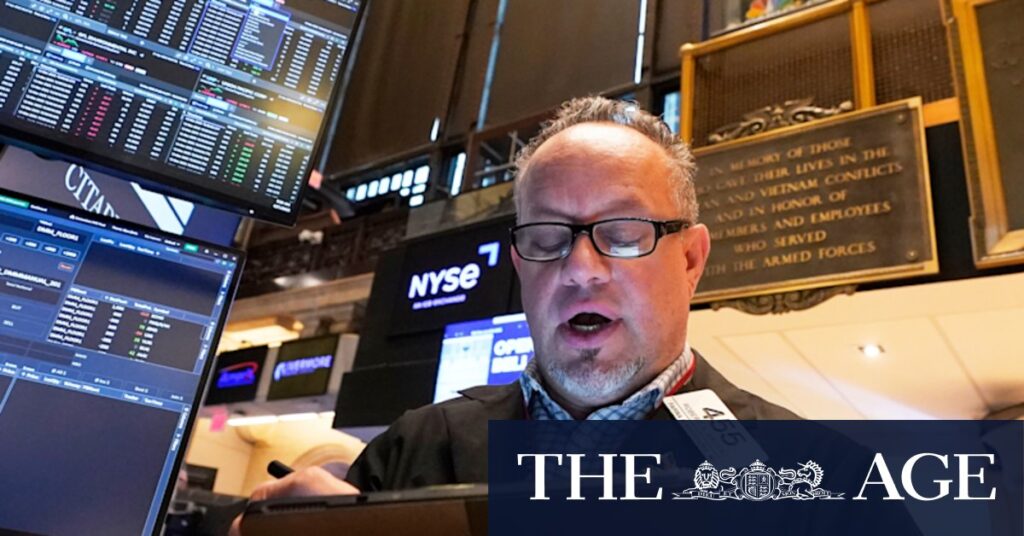
The Australian Securities Exchange (ASX) experienced a downturn on Wednesday, driven by declines in mining, retail, and financial stocks. This comes as Wall Street retreated slightly from record highs, with investors on edge ahead of the Federal Reserve’s anticipated interest rate decision. The S&P/ASX 200 index fell by 59.2 points, or 0.7%, closing at 8818.50, with eight out of eleven industry sectors in negative territory. The Australian dollar also slipped, dropping 0.2% to US66.73¢.
Mining stocks, which had previously led gains, suffered losses. Iron ore giants BHP, Fortescue, and Rio Tinto saw declines of 1.1%, 1.3%, and 1% respectively. Gold miners were not spared, despite gold prices rising above $US3700 an ounce for the first time, buoyed by a weakening US dollar and expectations of a Fed rate cut. Northern Star Resources fell 2.1%, Evolution Mining decreased by 1.3%, and Newmont lost 1.1%.
Banking and Retail Sectors Under Pressure
The big four Australian banks showed mixed results. Commonwealth Bank of Australia (CBA), the largest stock on the ASX, edged down by 0.1%, while National Australia Bank (NAB) dropped 1.5%, and Westpac fell 1%. In contrast, ANZ Bank saw a slight increase of 0.3%. Given that banks and miners constitute more than half of the ASX, their performance significantly influences the broader market.
Retailers also faced challenges, with Wesfarmers, the owner of Bunnings and Officeworks, falling 1.9%, and Harvey Norman declining by 2%. Shopping centre owners, including Scentre, Stockland, and Vicinity, experienced losses of 2.2%, 2.5%, and 3.5% respectively.
Energy Sector Gains Amid Market Uncertainty
Amidst the broader market decline, energy stocks provided a bright spot. Woodside Petroleum rose by 1.3%, and Ampol, Australia’s largest refiner, gained 0.6% as oil prices stabilized following a three-day rally. This uptick came as traders assessed the impact of Ukrainian attacks on Russian oil infrastructure. Coal miners also saw gains, with Yancoal rising 2.4% and Whitehaven Coal surging 5.2%. However, New Hope Corporation saw its shares plummet by 8.3%, erasing gains from the previous session after China reported reduced coal production in August.
Super Retail Group, which owns Rebel Sport and Supercheap Auto, rebounded by 2.7% after a 4.3% loss on Tuesday. The company had been embroiled in controversy following the dismissal of its CEO, Anthony Heraghty, over allegations of misleading the board regarding a personal relationship, which has led to a complex legal dispute.
Global Markets Await Fed Decision
Investor caution is palpable as markets await the Federal Reserve’s decision on interest rates, anticipated to be the first rate cut in the US this year. The ASX’s losses have effectively nullified gains from the previous day, mirroring a subdued session on Wall Street, where traders are in a holding pattern ahead of the Fed’s announcement.
“Global attention is fixed on the [Fed] announcement at 4am AEST, with markets fully pricing in a 25 basis-point rate cut — the first reduction since December,” said Moomoo dealing manager Jimmy Tran.
Josh Gilbert, a market analyst at eToro in Sydney, noted that markets are on edge, with the “biggest risk [being] that the Fed sounds less dovish than markets are hoping for.” Money markets are currently pricing in a quarter-point rate cut, with expectations of further cuts over the next year. A dovish outlook from the Fed would be welcomed by stock bulls, who are banking on a gradual easing to prevent the US economy from slipping into recession.
Stephanie Leung, Chief Investment Officer at StashAway, expressed on Bloomberg TV that “the market is looking for 25 basis points and another 25 basis points into the year-end.” Investors are also keenly watching for changes in the Fed’s quarterly rate projections, known as the dot plot, and will scrutinize Fed Chair Jerome Powell’s remarks during the rate decision announcement.
Wall Street and Broader Economic Implications
On Wall Street, US stocks pulled back slightly ahead of the rate decision. The S&P 500 dipped by 0.1% from its recent all-time high, the Dow Jones Industrial Average decreased by 125 points, or 0.3%, and the Nasdaq Composite slipped by 0.1% from its own record set the previous day.
Stocks have been rallying to record levels on expectations that the Fed will announce the first in a series of rate cuts aimed at boosting the economy. The labor market’s slowdown is perceived by traders as a more significant threat to the economy than inflation, exacerbated by President Donald Trump’s tariffs. While the Fed has been cautious about cutting rates due to inflation concerns, a reduction could provide the economy with a much-needed boost.
In related news, President Trump announced an agreement between the US and China to allow TikTok to continue operating in the US, potentially resolving a long-standing issue. “We have a deal on TikTok… We have a group of very big companies that want to buy it,” Trump stated at a White House briefing, just ahead of a deadline to sell or shut down the app.
Additionally, The New York Times shares fell by 1.6% following a $US15 billion defamation lawsuit filed by Trump against the newspaper and four of its journalists.
As markets brace for the Fed’s decision, the implications of a rate cut will be closely monitored, with potential ripple effects across global financial markets.






